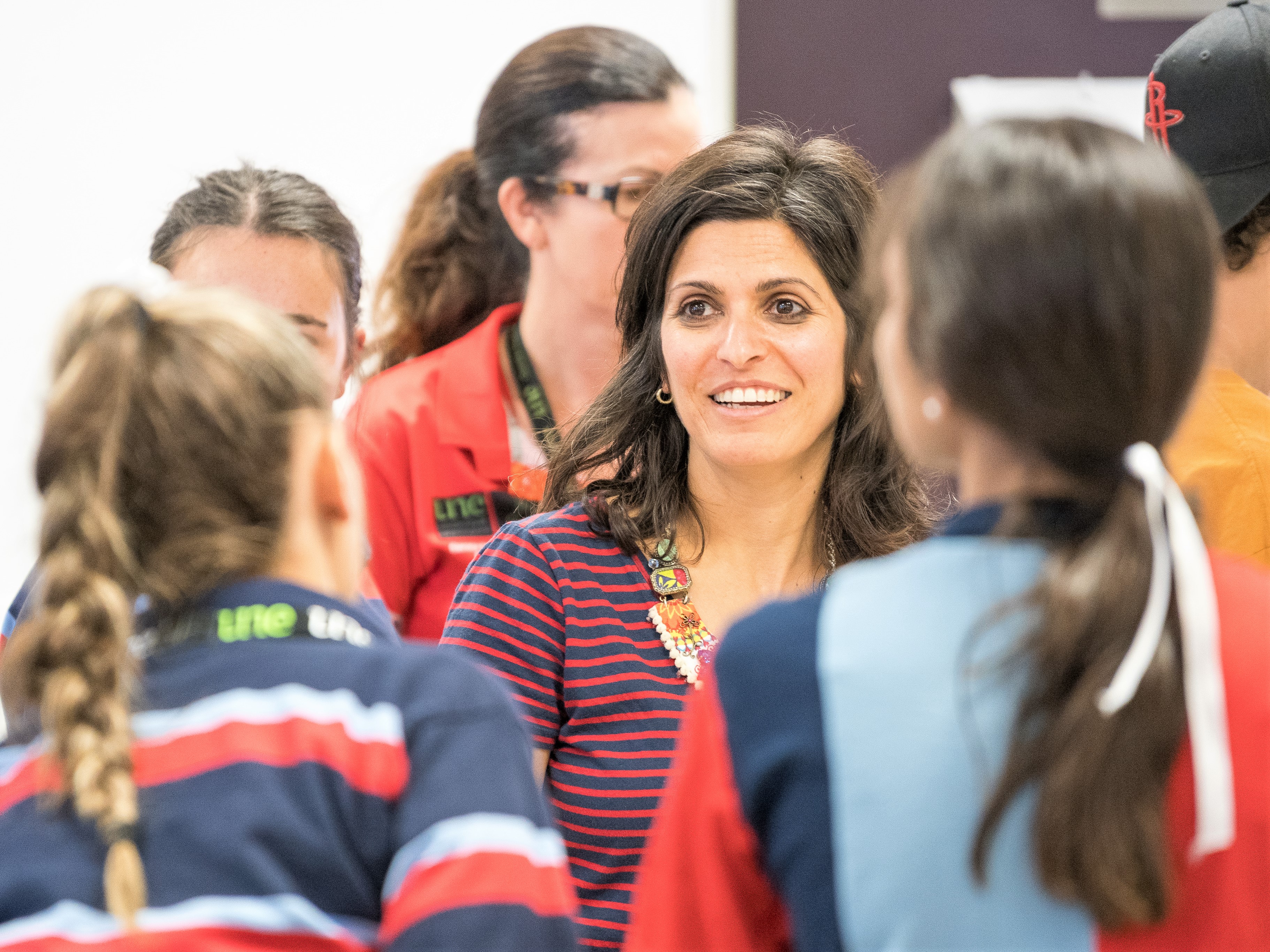Gal Winter has forged an international academic career studying the microbial ecosystems of humans and, more recently, plants, for the benefit of their hosts. She’s excited to be working in an emerging field that’s gained hugely in importance over the past decade.
“Over the past years, our view of microbes in the human body has shifted from viewing microbes as pathogens that are to be kept away from humans to understanding their important role for human development,” Dr Winter says.
“This is due to advances in technology that provide us with a more accurate assessment of the numbers and roles of microbes in their hosts, be they humans or plants.
“We are far from having a full understanding of the microbial-host interaction system, and every discovery opens new horizons and brings more questions to answer,” she says.
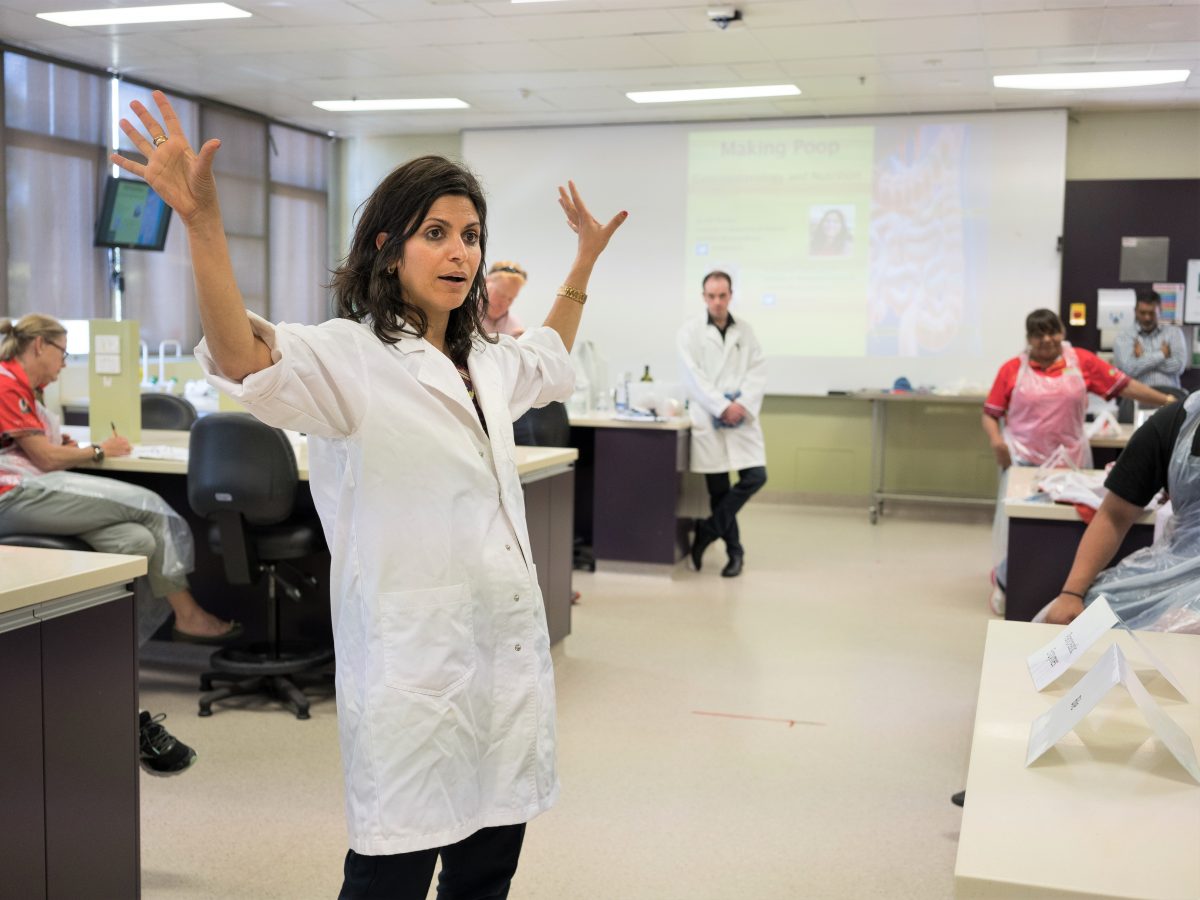
Dr Gal Winter in the laboratory, educating STEM students about nutrition and the digestive system. Credit: University of New England (UNE)
Early career: biochemistry and food science
Whether it be the millions of ‘good’ and ‘bad’ bacteria that make up humans’ gut microbiomes, or the tens of thousands of soil microbes that colonise the roots of plants, microbial colonies play a key role in their hosts’ health.
Gal Winter’s interest in microbial ecosystems began decades ago, in Israel, where she completed a Bachelor, then a Masters of Science in Biochemistry and Food Science at the Hebrew University of Jerusalem.
“Studying Food Science, I was particularly fascinated by the process of microbial fermentation,” she recalls. “It is the oldest form of biotechnology and humans were able to use and manipulate it in a way that has shaped our society, nutritionally and culturally.
“Fermentation technology is still fundamentally the same – although with the knowledge and tools that we have today, we are able to provide scientific reasoning for ancient practices and progress the system to deliver sophisticated outcomes.
“It still gives me great pleasure, every time I prepare sauerkraut or sourdough at home, to watch the microbial process and think that a million years ago, one of my ancestors was doing something very similar.”
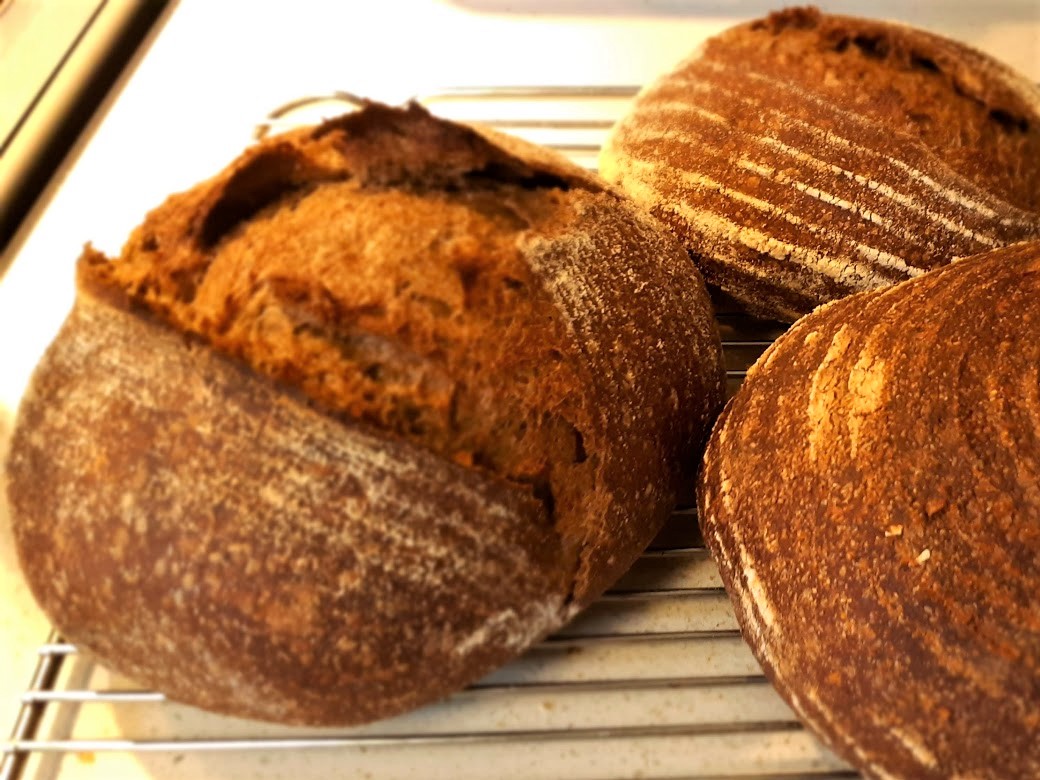
Dr Winter’s home-baked sourdough bread: “It still gives me great pleasure, every time I prepare sauerkraut or sourdough at home, to watch the microbial process and think that a million years ago, one of my ancestors was doing something very similar,” she says. Image: Courtesy of Dr Gal Winter
From Israel to Australia: a new microbial colony
In 2008, Dr Winter made a major career and lifestyle shift, relocating from Israel to Australia “to chase my professional dream of working on microbial food biotechnology and my personal dream of living the Australian lifestyle”, she says.
She was fortunate to have her studies fully funded by an international PhD scholarship granted by the University of Western Sydney – now Western Sydney University (WSU).
“Here, I worked in collaboration with the Australian Wine Research Institute on wine fermentation,” she recalls, “graduating with a PhD in molecular biology in 2013.
“I then commenced a postdoctoral fellowship at the University of Queensland (UQ), working on microbial biotechnology for the production of value-added chemicals.”
“In both roles, I used my knowledge of cellular metabolism to manipulate microbial cells and get them to produce desired compounds. For example, in wine fermentation, it was through different winemaking practices that would drive the yeasts to produce fruity aroma compounds.
“Understanding the process at the cellular level and seeing the effect these modifications have on the final product in large-scale fermentations was incredibly satisfying.”

Wine fermentation in progress. Credit Viacheslav Rubel/ Shutterstock
Putting down roots: University of New England
For the past four years, Dr Winter has been at the University of New England (UNE) in Armidale, NSW.
Here, she works as a Lecturer and Course Coordinator for UNE’s Bachelor of Biomedical Sciences, teaching courses including Clinical Microbiology and Virology; Issues in Human Nutrition; Human Nutrition and Metabolism; Clinical Biochemistry and Cell Biology; and Introductory Microbiology.
She also mentors and supervises talented postgraduate students – such as PhD Phil Thomas, who’s engaged on the CRC’s Tomato rhizobiome’ project – while pursuing research with real-world significance.
Dr Winter’s academic profile lists several ‘primary research areas’: gut microbiology; microbial ecology; antibiotic resistance; the gut-brain axis; and gut microbiology and nutrition.
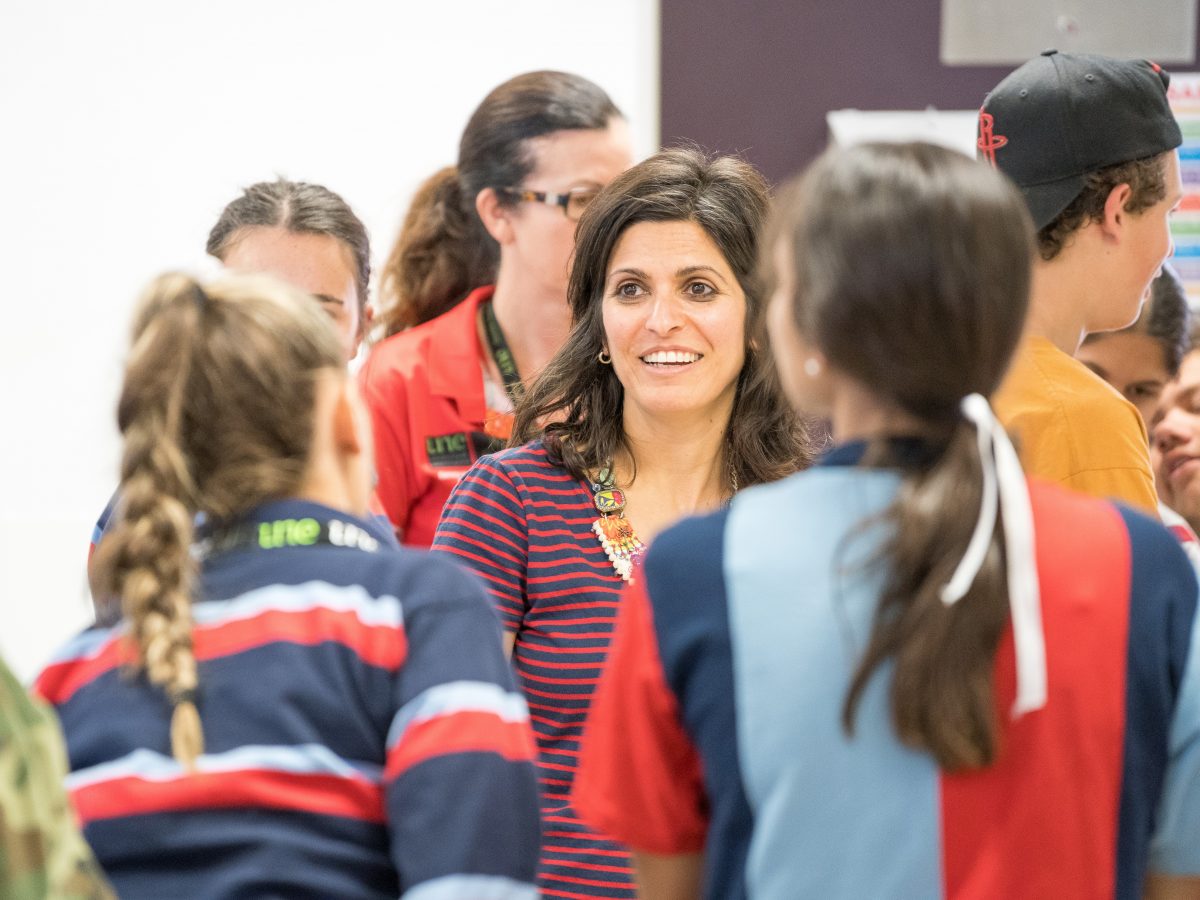
Dr Gal Winter with STEM students at the University of New England (UNE). Credit: UNE
Awards and accolades
Since arriving at UNE, Dr Winter has won several awards for excellence in teaching and research.
In 2017, she was awarded the university’s School of Science and Technology Excellence in Teaching award for curriculum development. The same year, she was included in the team of early and mid-career nutrition researchers accepted into the Australian Academy of Science’s Theo Murphy High Flyers Think Tank: ‘Rethinking food and nutrition science’, held in Perth
In 2018, UNE recognised Dr Winter with the School and Faculty Excellence in Teaching Award for Curriculum Development and the prestigious Dean’s Award for Early Career Research Excellence. The same year, she netted a CASS Foundation Travel Award, funding her to fly to and from the Netherlands for the 2nd International Conference on the Microbiota Gut Brain Axis, ‘Mind, Mood and Microbes’ in January 2019.
Last year, she was again the recipient of the Dean’s Award for Early Career Research Excellence, also netting a Teacher’s Travel Award from the Australian Society for Microbiology (ASM).
Dr Winter is a Member of the ASM and of the Australian Association for Clinical Biochemists (AACB).
The gut microbiome and its links with mind, mood and disease
“I am fascinated by the ‘microbiome revolution’: that is, the mounting evidence that suggest that the collective of microorganisms inhabiting the human body – the microbiome – has a significant influence on physical and mental health,” she says.
“I’m particularly interested in understanding the role of the gut microbiome in the diagnosis and treatment of depression. This research has the potential to impact on the health and wellbeing of Australians, with as many as one in six people being diagnosed with depression throughout their lifetimes.”
“Antidepressants are only effective in approximately 50 per cent of cases, and the reasons for that are unknown. It is also impossible to predict the success of the treatment, which means patients suffer through different treatment regimens before finding one that works if they’re fortunate. The gut microbiota is known to be connected with depression, and so understanding the role antidepressants have on the gut microbiota can be the key to understanding treatment efficiency.”
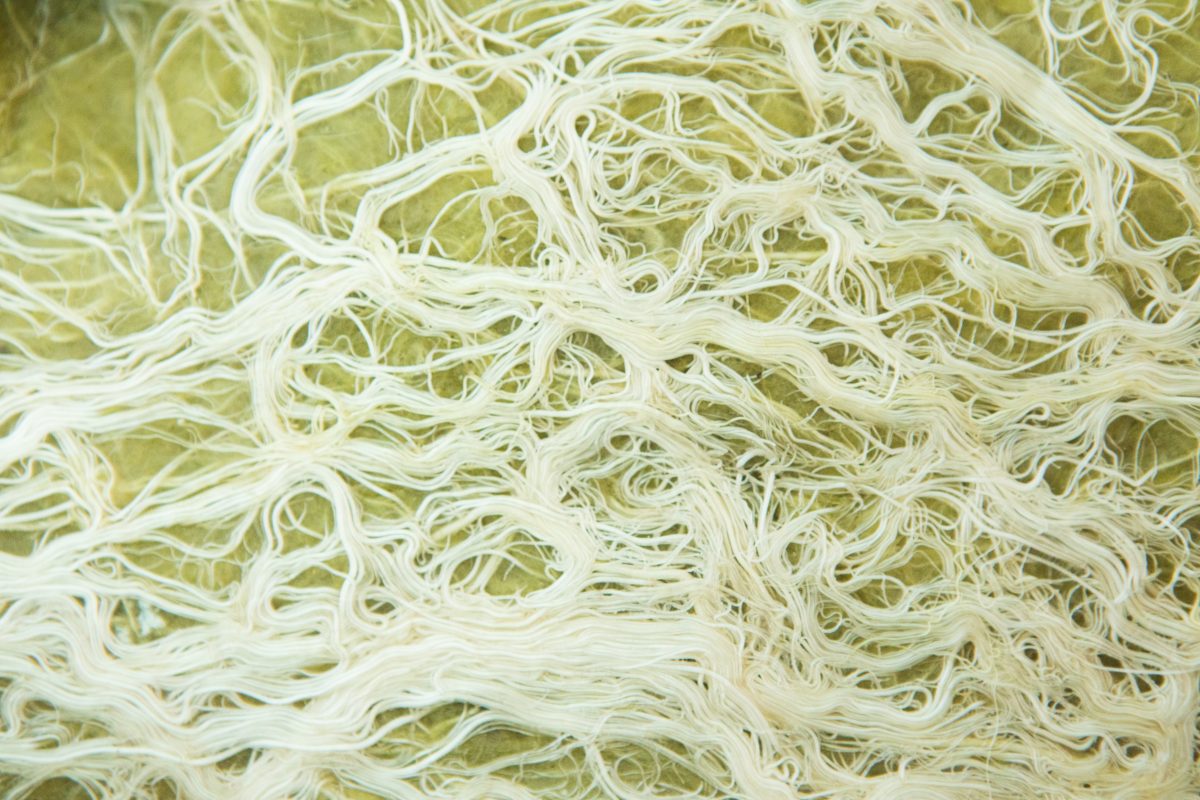
The root system of tomatoes grown hydroponically, in soilless media, in Tomato Exchange’s Guyra facility, Credit: Costa Group
Soil microbes and the rhizobiome
Dr Winter’s research also extends to investigating microbial colonies in soils and in the root zones of plants, and their impact on soil and crop quality and productivity. “I apply the principles of microbial diversity to other environmental systems, through academic and industry collaborations,” she explains.
In 2019, she and various colleagues published a review of the relationship between soil and mycotoxins in the European Journal of Soil Science. The following year, she co-authored a paper on co-composting and constraints on bioaccessibility in field-aged PAH-contaminated soils that was published in the Journal of International Biodeterioration and Biodegradation.
“My most recent collaboration is a study of the plant root microbiome in hydroponics systems – a project under the Future Foods Systems CRC,” Dr Winter says.
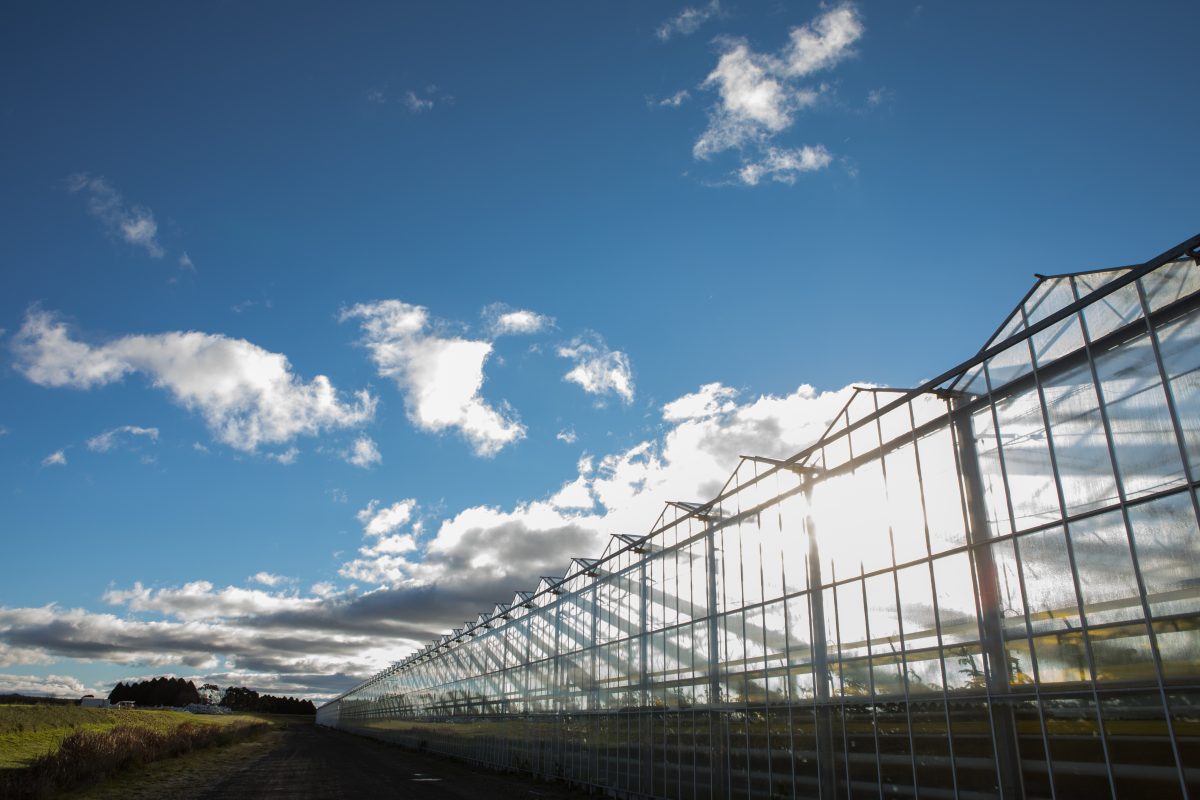
Costa Group’s vast Tomato Exchange glasshouse complex in Guyra, NSW.
The ‘Tomato rhizobiome’ project: a fruitful collaboration
Costa Group is one of Australia’s largest greenhouse tomato producers. Its premium specialty truss tomatoes are grown hydroponically in the company’s massive Tomato Exchange glasshouse facility at Guyra, not far from UNE’s Armidale campus.
In a four-year industry-research collaboration under the CRC, Dr Winter and her team are studying the microbial ecology of the root zone (rhizobiome) of hydroponically grown tomatoes. They’ll use this knowledge to optimise Costa Group’s probiotic application regime, thereby boosting crop quality and yield in Costa’s premium product.
“Glasshouse hydroponic horticulture is an environmentally friendly method for producing high-quality crops, but its commercial success depends on effective control of the plant pathogens that thrive in warm, moist conditions,” Dr Winter explains.
“Hydroponic growing media lack the vast diversity of microbes in soil, from which plants normally recruit beneficial organisms. To fill this gap, Costa growers apply probiotic supplements to promote growth and to protect plants against pathogens and abiotic stress. However, the efficacy of such supplements varies, and the activity of biotic agents is difficult to monitor with conventional tools.”
The ‘Microbial rhizosphere diversity in glasshouse hydroponic crops’ project aims to solve this problem.
“We’re seeking to characterise the behaviour of probiotic organisms in the root zones of hydroponically grown tomato plants,” Dr Winter explains. “Working closely with Costa Group’s greenhouse production team, we’ll then develop a practical method for routine monitoring of the plants’ root microbiomes.”
Costa Group has played a key role in the project from the beginning, she adds, with the project combining “two distinct disciplines that complement each other”.
“The conceptual framework for this project stemmed from personal conversations with Costa members about general science and the importance of the microbiome to its host,” she explains. “We soon realised that we describe similar processes across different systems – humans and tomatoes – and understood that together, we have the expertise to understand this interaction and manipulate it to support the plants.
“It is a pleasure to work with the Costa team, who are great scientists in their own right and world experts in growing tomatoes. With their extensive input, we were able to establish a tomato experimental glasshouse at UNE and adapt our protocols to maximise significance of our findings to real-life settings.”
Ultimately, Dr Winter hopes her research with Costa under the CRC “will lead to real-world change, and consideration of the plant rhizobiome as an important parameter in tomato-growing”.
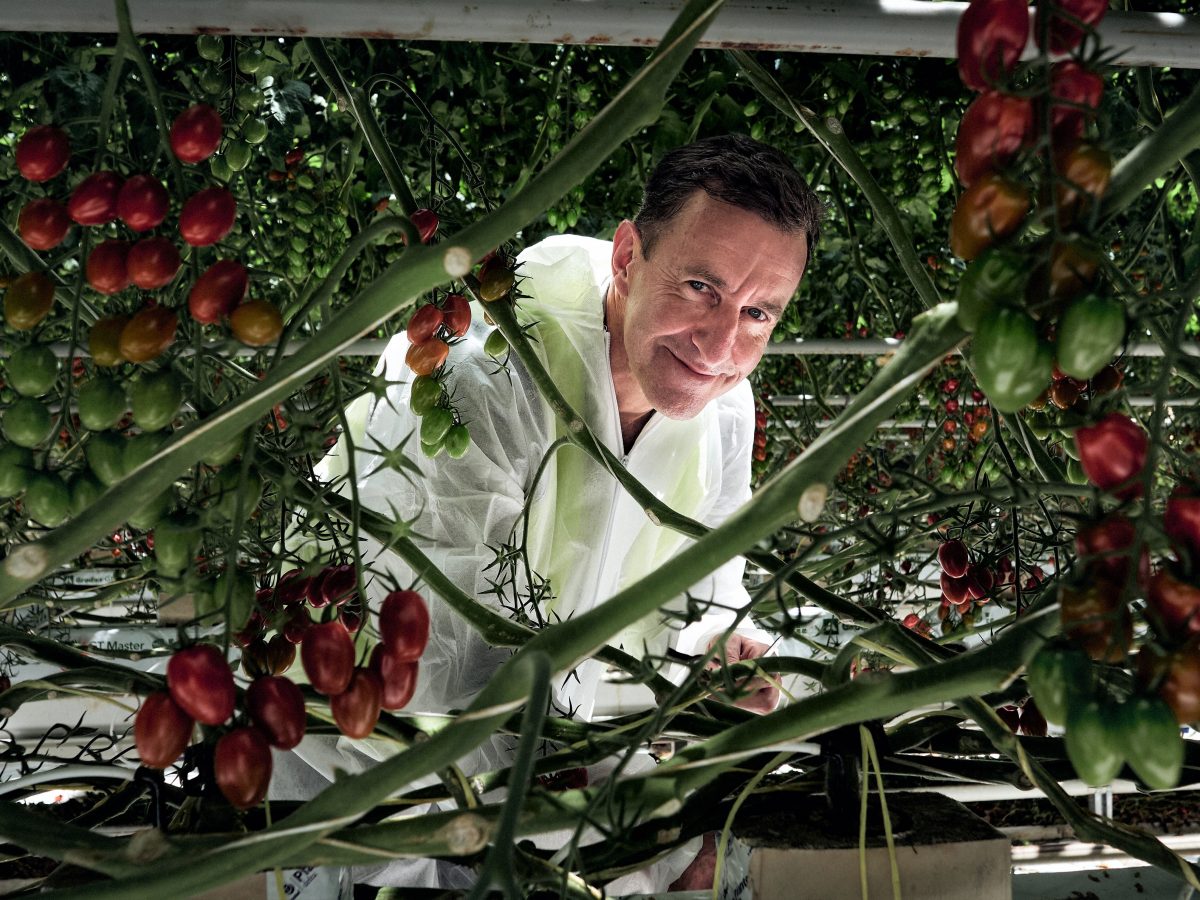
Mentoring an up-and-coming rhizobiome expert
As part of her role as project lead, Dr Winter is supervising PhD Phil Thomas, an IT professional-turned-microbiologist, enrolled at UNE and engaged under the CRC’s Industry PhD program.
“Phil and I have a history together, starting from when he was an undergraduate student in my Microbiology and Biochemistry units,” she explains. “He then approached me to do a research project in my lab, and I was delighted to have the opportunity to supervise him.
“Phil is very independent and always bring exciting research ideas, which we enjoy developing together. He communicates regularly with Costa members, who monitor his plant data on a daily basis and visit the UNE glasshouse once a week.”
Dr Winter, who’s guided several students successfully through postgraduate study, finds it a creative and rewarding process.
“My favourite aspects of the work of mentoring early-career researchers are brainstorming on research strategies and discussions on how to interpret our results,” she says.
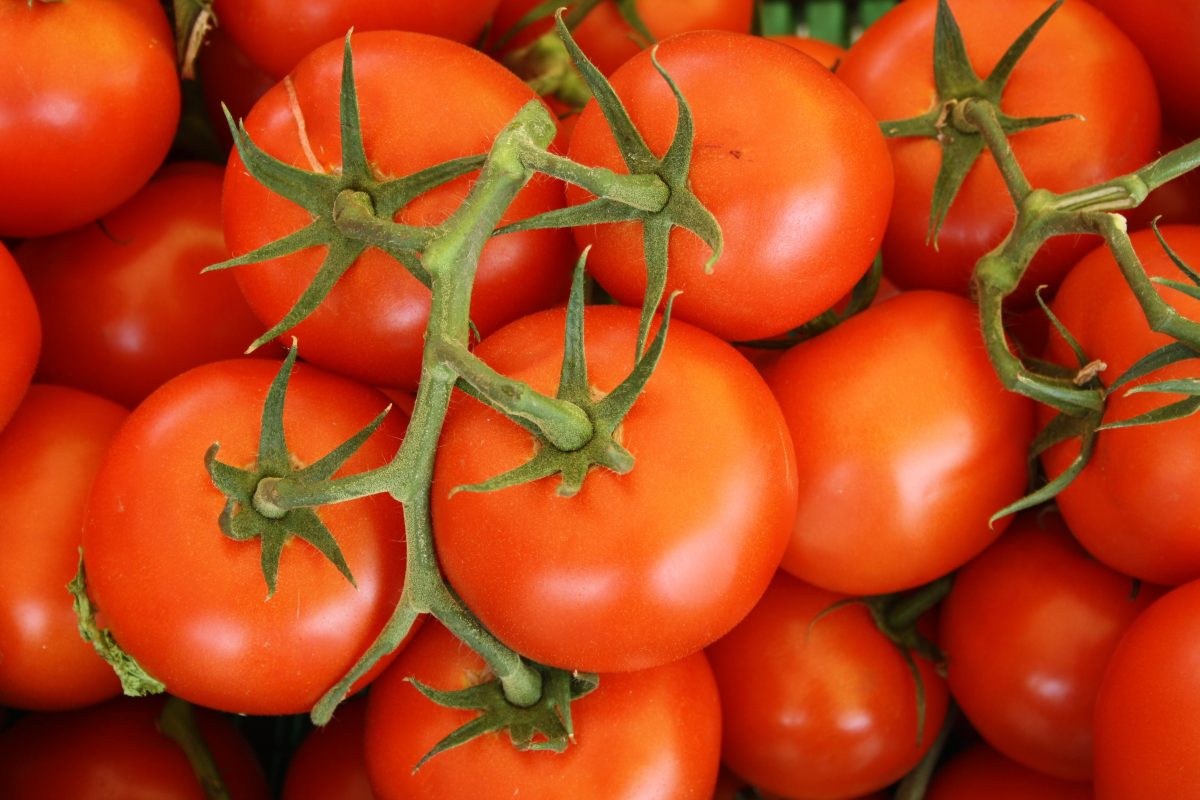
Gal Winter’s favourite food? “Tomatoes! In all shapes and forms. You can usually find at my house a pot with tomato sauce cooking or oven-roasted tomatoes, or just a bowl of tomatoes to eat fresh,” she says. Credit: Lars Blankers on Unsplash
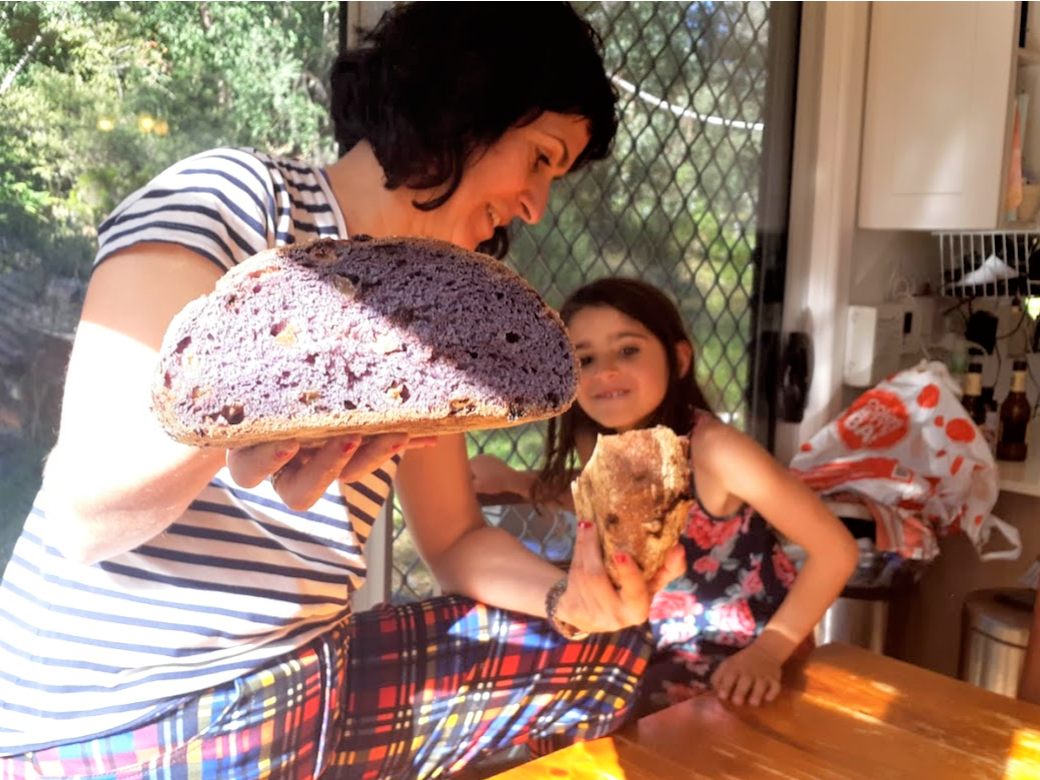
Dr Gal Winter at home with her daughter and a loaf of home-baked sourdough. Image: Courtesy of Dr Gal Winter
A taste for tomatoes
When she’s not in the laboratory at UNE or at Costa’s Guyra glasshouse complex, you might find Dr Winter “cooking up a storm” in her kitchen.
“I am a total foodie,” she says. “I love almost all things food-related, from buying fresh produce to cooking and of course eating.”
Her favourite food? “Tomatoes! In all shapes and forms. You can usually find at my house a pot with tomato sauce cooking or oven-roasted tomatoes, or just a bowl of tomatoes to eat fresh as a snack.
“I also love to experiment with fermentation and get creative with different sourdough recipes and all sort of fermented vegetables. I once tried to make fermented tomatoes but that actually did not end well.”


